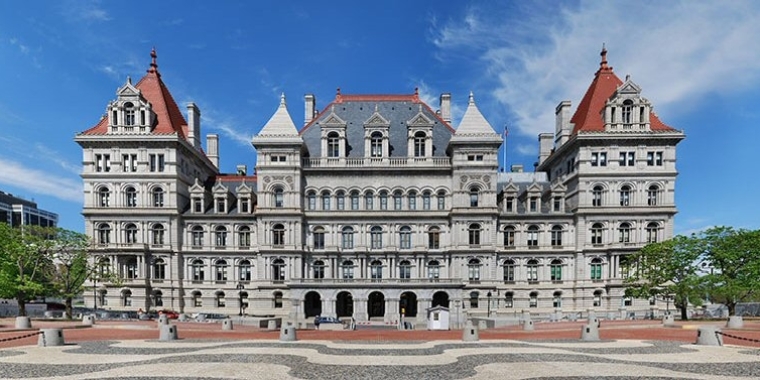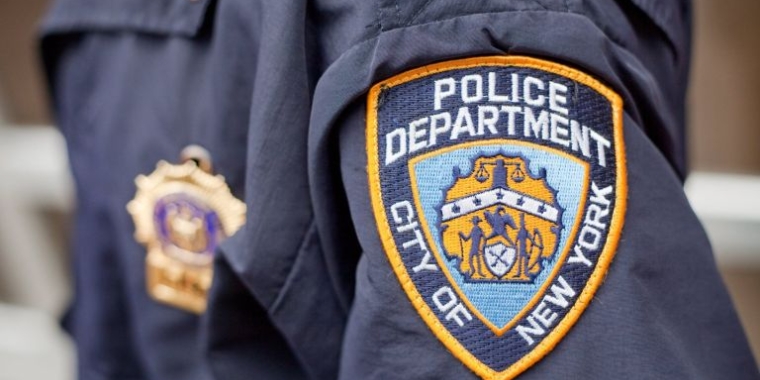
Senate Passes Public Safety Legislation
Martin J. Golden
April 24, 2013
-
ISSUE:
- Crime
Bills Come On The Heels of Boston Bombings & Foiled Terrorist Train Attack
With renewed calls for vigilance and increased public safety following the tragic bombings in Boston and the foiling of a terrorist plot to attack a train traveling across the state between New York and Toronto, the New York State Senate today passed a package of anti-crime legislation including a bill that would require convicted terrorists to serve their full prison sentence.
“The events in Boston were tragic and just today we are learning more about a terrorist plot to attack a train going from Canada, through Western New York, down to New York City,” Senate Republican Conference Leader Dean G. Skelos said. “We must do everything we can to support law enforcement and ensure that our laws are as strong as possible to deter terrorists and others who threaten the safety of New Yorkers. I urge the Assembly to act on these important public safety bills before the end of this session.”
Full Prison Time for Terrorists
The Senate passed legislation (S4342), sponsored by Senator Patrick Gallivan (R-C-I, Elma), that would require convicted terrorists to serve their full prison sentences by making them ineligible for early release programs. In addition, the bill would also apply to individuals convicted of all homicide crimes, hate crimes, and major drug trafficking crimes.
"Last week’s attack at the Boston Marathon, followed by news of a separate terror plot to strike a Western New York border crossing, reminds us that the capabilities of criminals have no limits and the horrendous nature of their crimes are ever evolving. So too must our laws to punish them,” Senator Gallivan, Chairman of the Senate Crime Victims, Crime and Correction Committee, said. “This bill provides our justice system with the updated tools it needs to ensure that the worst-of-the-worst – murderers, drug kingpins and purveyors of terror – are made to serve their full debt to society, without any form of early release."
In addition, the Senate passed the following bills to increase public safety, protect New Yorkers - particularly children - and to toughen penalties for criminals:
Committing Robbery with a Bomb
The Senate passed legislation (S1018), sponsored by Senator Joe Robach (R-C-I, Rochester), that would increase penalties for criminals who attempt robberies with devices appearing to be bombs or explosives. The bill would elevate the criminal charge from third degree to first or second degree robbery.
“If someone robs a bank by putting their hand in a pocket and pretending to have a gun, or by using a toy gun, that person is guilty of either a first or second degree robbery,” Senator Robach said. “But if that same person robs a bank and threatens to blow up the bank by displaying a device that appears to be a bomb, the person is only guilty of third degree robbery. That’s illogical because the threat of a bomb is every bit as serious, and arguably more serious, than the threat of a gun. This bill would correct this inequity in the law.”
Protect Our Children Act
The Senate approved the “Protect Our Children Act” (S1721A), sponsored by Senator Mark Grisanti (R-I, North Buffalo), which would create the new crime of aggravated murder of a child with a sentence of life in prison without parole.
The bill is being passed during National Child Abuse Prevention Month, would expand an existing law of aggravated abuse of a child which makes it a crime when someone recklessly causes physical injury to a child under the age of 14.
"This legislation will help to protect our children from anyone who is put in a position of trust to care for them and instead commits the ultimate violation by abusing them in some way," said Senator Grisanti. "This bill would increase the severity of punishment for anyone who would cause harm to a child; I am calling on the Assembly to pass this legislation immediately!"
The law currently applies only to day care providers, but this bill would expand it to also apply to parents, guardians or a person in a position of trust. The legislation identifies a person in a position of trust to mean any person who is charged with any duty or responsibility for the health, education, welfare, supervision or care of another person, either independently or through another person under 14 years of age, no matter how brief a time period it may be.
Other provisions of the bill would:
> Create a new felony for concealing the death of a child. A death of a child is profoundly tragic, and the concealment could not only interfere with the prosecution of the one responsible for the death by loss of evidence, but could also prolong the agony of the family as they search for their loved one with misplaced hope;
> Create a new felony for failing to notify law enforcement when the whereabouts of a young child is unknown for more than 24 hours;
> Create new felony offenses for obstructing the location of a missing child;
> Create a felony child endangering statute to protect children from especially cruel and sadistic conduct. Under current law, unless physical injury results, the infliction on children of sadistic, painful, dangerous punishments can typically be charged only as misdemeanors;
> Create a statute to protect children from serious reckless abuse. To the extent existing laws address reckless conduct, they minimize the seriousness by treating it as a low-level offense or often include the requirement that the conduct be "depraved," an element that New York courts have in recent years interpreted in a way that is extremely difficult to prove; and
> Increase penalties for repeat child abusers.
Expanding Ages for Aggravated Assault of a Child
The Senate approved legislation (S1456), sponsored by Senator John Flanagan (R-C-I, East Northport), that changes the maximum age of a victim of Aggravated Assault of a Child from less than 11, to less than 14.
“Our children deserve to live their lives without fear of those who may prey on them. Assault on any New Yorker is unacceptable and, by expanding current protections in place for children under eleven years of age to include eleven, twelve and thirteen year olds, this legislation will let those who target our most vulnerable know that they will be held responsible for their intolerable actions. I urge the Assembly to join the Senate in passing this change,” stated Senator Flanagan.
Under existing law, a person is guilty of Aggravated Assault of a Child when the perpetrator is at least 18 years old and assaults someone less than 11 years old and has been previously convicted of the same crime within the preceding three years.
In addition to increasing the age from 11 to 14, this bill would allow for any prior assault to serve as the predicate for this crime and expands the predicate time period from three to 10 years.
Tougher Penalties for Assaulting a Police Officer
The Senate passed a bill (S4445A), sponsored by Senator Martin Golden (R-C, Brooklyn), that would increase the penalty for aggravated assault against a police or a peace officer to life without parole when the person convicted has two prior serious violent felonies.
“Existing law provides for life without parole for cop killers and stiff sentences for persistent violent felons. However, this penalty does not apply to criminals with multiple prior violent felonies who then attack police officers,” Senator Golden said. “This bill mandates a sentence of life without parole for these incorrigible criminals.”
Under current law, a persistent violent felony offender convicted of aggravated assault of a police officer (a class B felony) must only be sentenced to a minimum prison term between 20 and 25 years. This bill provides increased penalties for certain violent felony crimes committed against a police officer. It also states that a persistent violent felony offender convicted of aggravated assault on a police officer, would be sentenced to life without parole.
Cracking Down on Methamphetamine Production
The Senate passed a bill (S3639), sponsored by Senator Thomas O’Mara (R-C, Big Flats), that would toughen criminal penalties for the manufacturing of methamphetamines and for the possession of materials used to make methamphetamines.
The bill elevates penalties for every level of felony crime related to methamphetamine production, up to and including an A1 felony, punishable by between 15 to 25 years in prison.
“We need to send a strong message that we’re not going to tolerate the operation of meth labs. Meth labs pose unacceptable risks to our neighborhoods, threaten the safety of police officers and first responders, and burden local systems of health care, criminal justice and social services,” said Senator O’Mara. “Our laws need to keep pace with the goal of putting meth manufacturers out of business in New York State. The only byproducts of meth are addiction, tragedy and violence. ”
According to the United States Department of Justice, methamphetamine is one of the nation's greatest drug threats. A recent department report noted that the drug is at its highest levels of availability and purity -- and lowest cost -- since 2005. That's attributed to rising Mexican imports, but also because of increased small-scale domestic production.
A 2009 report from the Rand Corporation estimated the economic cost of meth use in the United States reached nearly $24 billion in 2005 and could go as high as $48 billion.
Gang Recruitment on School Grounds
The Senate passed a bill (S2458), sponsored by Senator Andrew Lanza (R-I, Staten Island) making it a felony to recruit street gang members on school grounds.
“Gang violence, particularly among our teens, is a growing problem that is making its way into schools, putting students and staff at risk,” said Senator Andrew Lanza (R, Staten Island). “The only way to stop violent, drug dealing gangs from recruiting our children with threats, intimidation and violence is to enact tough laws against them, which is just what this package of legislation does.”
This legislation seeks to provide a safe haven for juveniles by making it more difficult for gang leaders to actively recruit and solicit children in and around schools.
The bills have been sent to the Assembly.
Share this Article or Press Release
Newsroom
Go to Newsroom2018 Civil Service & Pensions Committee Annual Report
December 27, 2018

Golden to Mayor: Time for police negotiations long overdue.
August 6, 2018

Concepcion "Connie" Ranocchia
May 15, 2018

